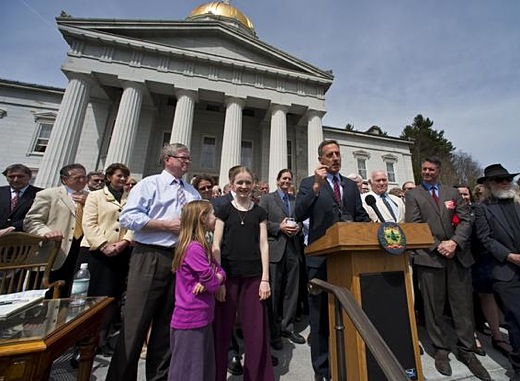SUBHEAD: Now that Vermont has put GMO labels into law, will the debate go national?
By Venessa Wong on 9 May 2014 got Bloomber Businessweek -
(http://mobile.businessweek.com/articles/2014-05-09/now-that-vermont-put-gmo-labels-into-law-will-the-debate-go-national)

Image above: ermont Gov. Peter Shumlin speaks before signing a bill requiring the labeling of food with GMO ingredients during a ceremony at the Statehouse in Montpelier last Thursday. From (http://www.spokesman.com/photos/2014/may/09/250592/).
It’s not surprising that a liberal haven such as Vermont would become the first state to mandate labeling of genetically modified organisms—take that, California—and Vermont Governor Peter Shumlin singed the measure into law this week as expected, with Ben & Jerry’s chief executive, Jostein Solheim, by his side.
The nation’s first foray into GMO labels, if it survives legal challenge and goes into effect in 2016, would pave the way for other states considering labeling laws.
In Vermont (population 626,630), the labeling regime offers these designations for foods: “produced with genetic engineering,” “partially produced with genetic engineering,” or “may be produced with genetic engineering.”
Any retailer unsure about a particular product will have to use the third label. The state is already preparing to defend the new requirements and has created a fund to help implement the law, “including costs and fees associated with expected challenge in court by food producers.” The Grocery Manufacturers Association has already announced plans to file suit in federal court against Vermont to overturn the law.
In fact, the food industry group wants to settle the matter not just in Vermont, but nationwide.
The industry position: If consumers want to avoid GMOs, they should buy organic, for which there already is an established system for labeling (all USDA certified organic foods are GMO free).
It instead proposes that the Food and Drug Administration review genetically modified organisms and, if the agency determines there is any health, safety, or nutrition risk, establish national labeling standards so food companies do not have to deal with state-by-state requirements.
The FDA regulates food from genetically engineered crops in conjunction with the U.S. Department of Agriculture and the Environmental Protection Agency.
The USDA makes sure that all new plant varieties pose no risk to other plants, while the EPA regulates pesticides, including those bioengineered into crops, and the FDA regulates the safety of foods and ingredients for human use, a job that extends to labels.
The FDA states on its website that it currently supports voluntary labeling and notes that foods don’t go on the market before resolving the FDA’s questions about the long-term safety.
Even other states with GMO label laws on the book are looking for something broader than a state-by-state approach. Maine and Connecticut have passed label that won’t take effect unless other states follow suit: Maine will wait for a critical mass of neighboring states to pass their own laws, and Connecticut wants to see at least four states with a combined population of 20 million embrace label mandates before putting its own law into effect.
.
By Venessa Wong on 9 May 2014 got Bloomber Businessweek -
(http://mobile.businessweek.com/articles/2014-05-09/now-that-vermont-put-gmo-labels-into-law-will-the-debate-go-national)

Image above: ermont Gov. Peter Shumlin speaks before signing a bill requiring the labeling of food with GMO ingredients during a ceremony at the Statehouse in Montpelier last Thursday. From (http://www.spokesman.com/photos/2014/may/09/250592/).
It’s not surprising that a liberal haven such as Vermont would become the first state to mandate labeling of genetically modified organisms—take that, California—and Vermont Governor Peter Shumlin singed the measure into law this week as expected, with Ben & Jerry’s chief executive, Jostein Solheim, by his side.
The nation’s first foray into GMO labels, if it survives legal challenge and goes into effect in 2016, would pave the way for other states considering labeling laws.
In Vermont (population 626,630), the labeling regime offers these designations for foods: “produced with genetic engineering,” “partially produced with genetic engineering,” or “may be produced with genetic engineering.”
Any retailer unsure about a particular product will have to use the third label. The state is already preparing to defend the new requirements and has created a fund to help implement the law, “including costs and fees associated with expected challenge in court by food producers.” The Grocery Manufacturers Association has already announced plans to file suit in federal court against Vermont to overturn the law.
In fact, the food industry group wants to settle the matter not just in Vermont, but nationwide.
The industry position: If consumers want to avoid GMOs, they should buy organic, for which there already is an established system for labeling (all USDA certified organic foods are GMO free).
It instead proposes that the Food and Drug Administration review genetically modified organisms and, if the agency determines there is any health, safety, or nutrition risk, establish national labeling standards so food companies do not have to deal with state-by-state requirements.
The FDA regulates food from genetically engineered crops in conjunction with the U.S. Department of Agriculture and the Environmental Protection Agency.
The USDA makes sure that all new plant varieties pose no risk to other plants, while the EPA regulates pesticides, including those bioengineered into crops, and the FDA regulates the safety of foods and ingredients for human use, a job that extends to labels.
The FDA states on its website that it currently supports voluntary labeling and notes that foods don’t go on the market before resolving the FDA’s questions about the long-term safety.
Even other states with GMO label laws on the book are looking for something broader than a state-by-state approach. Maine and Connecticut have passed label that won’t take effect unless other states follow suit: Maine will wait for a critical mass of neighboring states to pass their own laws, and Connecticut wants to see at least four states with a combined population of 20 million embrace label mandates before putting its own law into effect.
.
No comments :
Post a Comment